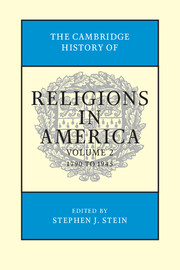Book contents
- Frontmatter
- Contents
- Contributors
- Editor's Introduction
- SECTION I RELIGION IN NORTH AMERICA
- SECTION II RELIGIONS IN THE NEW NATION, 1790–1865
- SECTION III CHANGING RELIGIOUS REALITIES
- SECTION IV RELIGIOUS RESPONSES TO MODERN LIFE AND THOUGHT
- 21 Religion and Immigration, 1865–1945
- 22 Religion and the Modern City, 1865–1945
- 23 Religious Responses to Industrialization, 1865–1945
- 24 Religious Responses to Modern Science, 1865–1945
- 25 Religious Responses to Philosophy in America, 1865–1945
- 26 Fundamentalism
- 27 Religiously Informed Social Reform and Reaction in the Era of the Great Depression
- 28 Nativism from the New Republic to the Cold War
- 29 Between God and Caesar: World War I and America's Religious Communities
- 30 World War II and America's Religious Communities
- SECTION V COMPARATIVE ESSAYS
- SECTION VI RELIGION AND DIVERSE AREAS
- Index
- References
24 - Religious Responses to Modern Science, 1865–1945
from SECTION IV - RELIGIOUS RESPONSES TO MODERN LIFE AND THOUGHT
Published online by Cambridge University Press: 28 July 2012
- Frontmatter
- Contents
- Contributors
- Editor's Introduction
- SECTION I RELIGION IN NORTH AMERICA
- SECTION II RELIGIONS IN THE NEW NATION, 1790–1865
- SECTION III CHANGING RELIGIOUS REALITIES
- SECTION IV RELIGIOUS RESPONSES TO MODERN LIFE AND THOUGHT
- 21 Religion and Immigration, 1865–1945
- 22 Religion and the Modern City, 1865–1945
- 23 Religious Responses to Industrialization, 1865–1945
- 24 Religious Responses to Modern Science, 1865–1945
- 25 Religious Responses to Philosophy in America, 1865–1945
- 26 Fundamentalism
- 27 Religiously Informed Social Reform and Reaction in the Era of the Great Depression
- 28 Nativism from the New Republic to the Cold War
- 29 Between God and Caesar: World War I and America's Religious Communities
- 30 World War II and America's Religious Communities
- SECTION V COMPARATIVE ESSAYS
- SECTION VI RELIGION AND DIVERSE AREAS
- Index
- References
Summary
American religious thought generally kept pace with the nation's continued social and cultural growth throughout the first half of the nineteenth century. Prominent universities such as Harvard, Yale, and Princeton supported thriving Protestant seminaries, enabling the nation to produce a steady stream of academically sophisticated theologians. Many of these were conversant with recent scientific writings in botany, chemistry, physics, and geology. They incorporated their scientific knowledge into a sophisticated natural theology built on the premise that nature contains clear, compelling evidence of God's existence and perfection.
Antebellum natural theology rested on two basic premises. First was the assumption that God created the natural universe, which therefore contains evidence of his creative design. Second was total certainty that God has also provided completely reliable information about himself in the Bible. Natural theology expressed American Protestantism's confidence that our universe had a sudden beginning as explained in Genesis, evidenced a divinely orchestrated development, and was heading toward a predetermined end, the salvation of the faithful and the establishment of the kingdom of God.
The natural theology developed in the first six decades of the nineteenth century was, however, destined to break apart after the publication of Charles Darwin's On the Origin of Species by Means of Natural Selection in 1859. Before 1860, theologians had been able to reconcile biblical faith and sciences such as botany or geology with relatively little difficulty.
- Type
- Chapter
- Information
- The Cambridge History of Religions in America , pp. 523 - 544Publisher: Cambridge University PressPrint publication year: 2000



